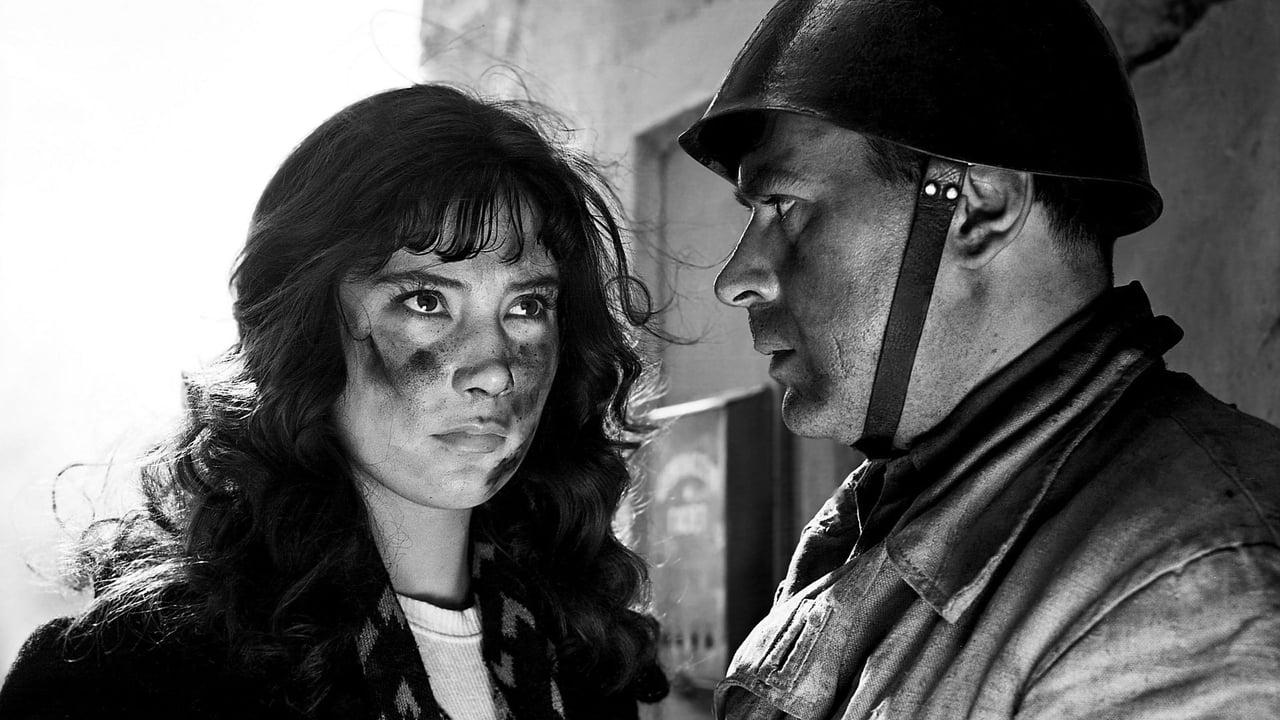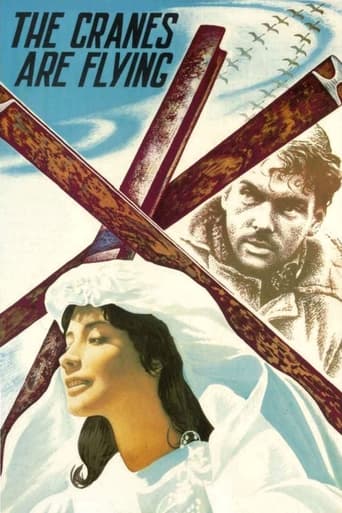

The greatest movie ever!
... View MoreLack of good storyline.
... View MoreClever, believable, and super fun to watch. It totally has replay value.
... View MoreIt is an exhilarating, distressing, funny and profound film, with one of the more memorable film scores in years,
... View MoreThe Cranes Are Flying (Russian: Letyat zhuravli) (1957) Kind Veronika, Nicknamed "Squirrel" by her Boris, Before he departs, Gives her a stuffed squirrel and note. His last tragic love letter. Innocent young love, Cut short by the heartless war. Betrayal, rape, shame. Creative camera work Conveys war's calamity. (Tanka [短歌 tan-kah]) poems are short poems that are five lines long, with the 5-7-5-7-7 syllable format.
... View MoreMost definitely one of the best works of cinematography I have seen. Sergei Urusevsky is truly a cinematic genius. Many of the scenes in this film are shot with a hand-held camera, and the shots are incredible. Urusevsky conveyed the feelings and emotions of the characters through the camera, which is difficult for a lot of filmmakers to do. Not only is this a great film in terms of technique, but it is also a very beautiful story as well. The actors are great, the story is great, and just the film itself is great. I highly recommend this film to anyone; whether you are wanting to analyze it or just enjoy it. It is very beautiful and moving film; as well as a piece of cinematic art.
... View MoreJust like the film's young lovers, The Cranes Are Flying, has a naive and adolescent approach to its heavy material. Famous for re-igniting Soviet cinema in the post-Stalin era and for winning the Palme D'or at the Cannes film festival, the film's style isn't too far away from the bombast of Hollywood, even for today's standards. Much of its sequences are very loose, often conceptual, perhaps not taking enough care for its characters despite the relationships being the proposed centrepiece. However, the true star of the film, is the incredibly cinematography. The camera goes to places where I didn't even know it could go. Cranes are particularly used inventively, with an unforgettable shot from hand-held in a bus to high in the air all in the same take and also a shot of a character going up some spiral stairs with the camera following him in the centre of the staircase. It's remarkably bold.Unfortunately, while this film does have some intense dramatic moments, what it does lack is a focused protagonist. It opens with the main couple together then refuses to choose which perspective the film is told from. This doesn't keep it from being rather poignant, if they are just to represent any man and any woman in this scenario rather than being developed characters - this is probable in a scene where the woman is a nurse treating soldiers and the soldier is a victim to a similar tale she's involved in but not connected to. It's a very engaging film, the highlights being the magnificent canvases of disorientating camera-work and powerful editing during the most vivid and exaggerated sequences and held back by the domestic moments where it doesn't quite know how to approach it. Regardless, the ideas and energy are pure cinematic magic.8/10
... View MoreThe Cranes Are Flying is a film just as mesmerizing as the title suggests. It's stark and poetic, emotional but existential, it's about human nature, human life, human circumstance. The story is a simple and often told one, but then again, the stories of life tend to be simple and often told. The heart of the film lies in the very beginning where the two young lovers Veronika (Tatyana Samojlova) and Boris (Aleksey Batalov) stand in each other's arms and watch the cranes flying in the sky. They love each other. They don't know it yet, but they are about to be separated by war. This is the first and last moment of peace, harmony and love in their lives. The rest of their years are going to be filled with heartache, guilt, hardships, hunger, grief, death. The film ends on a hopeful and even joyous note. You have to see it to believe it.This is the first point. Very simple. It's a wonderful film that you should see. Then there are the historical notes, and the technical qualities to marvel about. Based on a play by Viktor Rozov, who wrote the screenplay, the film was directed by Mikhail Kalatozov who was one of the first Soviet filmmakers to emerge and blossom after Stalin's death (he was his former head of production). He would make tremors with his 1964 pro-Castro documentary I Am Cuba, but The Cranes Are Flying won him the Palme D'Or in 1957. It's no wonder either, not only does the film prove amazing craftsmanship but it would also remind anyone of a more general European art film from the same time (the French New Wave easily comes into mind). At the same time, it seems to have managed to pass all of the demands from the Soviet Union. It doesn't come off as a patriotic spectacle of propaganda but, as I said, it does end hopefully, with the love for the people shining from within the people itself.Tatyana Samojlova is the heroine of the film, and Kalatozov is occupied following her with the greatest of care. Much of the film is portrayed in silence, but it's not the kind of artistic silent quality you might expect. It's a quiet film, the absence of sound is naturalistic, as are the cranes in the sky and the feelings of Veronika as her childish romance dies out while she grows older in the war times. She loves Boris, lost in field. She marries a man she doesn't love. The film suggests feelings of guilt and shame. We're not sure, Samojlova is too human. There are breathtaking moments of film making in this film that, made in 1956, seems to predate most original methods of film making - and, I'd say, to this day it's not often you see sequences like the one where she is desperate, running along a train seemingly at the same speed, whilst the film itself seems to react at the sudden impact of speed and emotion. It's like the entire film looses control over itself, she almost outruns it herself, and you can't say what will happen the very next second or, once that second has passed, the second after that.This is a film about human beings, the value of human life, of love and family and hope. But it's not entirely an anti-war film, as one might suppose. This is a film where the characters face their sadness and their emotional tragedies right up front and never tries to deny them or shun from them, or in any way prolong their suffering. There is a higher cause and life must be lived by the citizens of an entire country in hope, because if we loose hope the suffering will have been pointless.
... View More